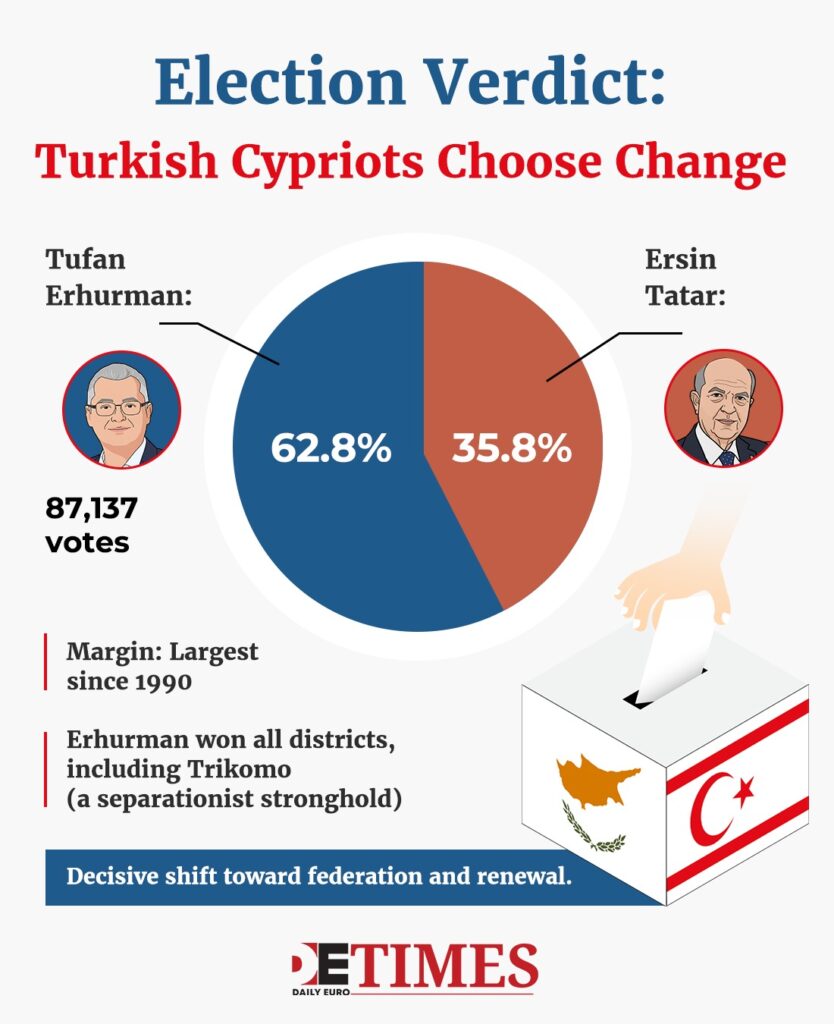After five years of drift, 87,000 voters delivered an unambiguous verdict on the island of Cyprus in the Mediterranean.
Tufan Erhurman secured 62.8 percent of votes in October’s presidential election. His opponent, incumbent Ersin Tatar, managed only 35.8 percent. The margin surpassed every Turkish Cypriot election since 1990.
Erhurman earned a record 87,137 votes. He won every electoral district, including Trikomo, which is typically a stronghold for separation.
Economic Hardship Drives the Vote
Living standards have eroded under the depreciation of the Turkish lira. Food inflation led European economies. Families earning minimum wage now live at the hunger threshold.
The Turkish lira lost 40 percent of its value in one year alone. Salaries arrive in lira while rent, cars, and school fees demand foreign currency. Bread prices jumped 25 percent since January. Voters blamed Tatar’s closeness to Ankara for worsening these conditions.
A Renewed Push for a Federal Settlement
Erhurman campaigned for restarting negotiations under UN frameworks. Greek Cypriot President Nikos Christodoulides welcomed the outcome immediately. He expressed readiness to meet “as soon as possible.”
Turkish President Erdogan congratulated Erhurman while pledging to defend Turkish Cypriot sovereignty. Erhurman, who served on negotiating teams between 2008 and 2010, provides grounding for upcoming talks. The development follows a UN Secretary-General report of a “new atmosphere” after recent confidence-building discussions in Geneva.
Erhurman stated the Turkish Cypriot people won through the collective decision. He also promised consultations with Ankara on foreign policy matters.

Building Economic and Social Bridges
While politicians prepare for talks, functional cooperation is already growing. The European Union allocated €39.5 million in 2024 for Turkish Cypriot development and has invested €688 million in community projects since 2006.
These efforts yield tangible benefits. Trade across the Green Line increased 9.6 percent to reach €16 million. Crossings totalled 7.1 million authorised passages in 2023. Three Turkish Cypriot halloumi producers have gained approval under Protected Designation of Origin rules.
The World Bank estimates Green Line trade captures 10 percent of Turkish Cypriot external sales, though the potential remains far higher.
Economic participation is also changing society. Female employment hit record highs in 2023, with women taking 44 percent of the 9,600 new jobs created. The expanded labour market spreads prosperity more evenly and reduces dependency on Turkish fiscal support.
Young Turkish Cypriots increasingly work and study in government-controlled areas. These connections build practical foundations for eventual reconciliation.
Turkish Cypriot Berk Tansel told journalists his generation is dropping the blame game. Greek Cypriot Christiana Eftychiou echoed that sentiment about thinking as one whole.
A Consistent Choice for Partnership
The desire for partnership is not new.
Turkish Cypriots supported the 2004 Annan Plan with 65 percent approval. Greek Cypriots, however, rejected that same proposal with 76 percent opposition. The UN had called for lifting economic restrictions after Turkish Cypriot voters backed reunification.
Two decades later, Turkish Cypriots have again chosen federation. The 2025 result confirms a consistent preference for ending isolation.
The election verdict is unambiguous. Turkish Cypriots want prosperity through partnership. They rejected five years of stalemate decisively.
Economic hardship under Ankara’s tightening grip drove voters toward reunion.
Regional Factors and Future Hurdles
Broader regional factors are also at play. Natural gas deposits lie offshore between Cyprus and Israel. A unified Cyprus could streamline resource development, as exploration rights remain contested under the current partition.
After receiving his mandate, Erhurman first travelled to Ankara. Greek Foreign Minister Giorgos Gerapetritis described the election as opening a "new chapter of hope."
Athens coordinates closely with Nicosia on UN agenda items, and an enlarged meeting awaits scheduling in New York. British bases on the island add another layer of calculation to Mediterranean arrangements.
Despite the political opening, the World Bank projects growth slowing to 4.2 percent amid fiscal pressures. Products entering the Turkish Cypriot community are priced at a premium compared to European economies.
Regulatory distortions drive inflation higher. Addressing these bottlenecks would ease living standards immediately.
Whether negotiations succeed depends on flexibility from all parties. The opening exists. How long it stays open remains uncertain. One thing seems certain: Turkish Cypriots chose their direction. Europe should respond accordingly.
Keep up with Daily Euro Times for more updates!
Read also:
Cyprus: Israel’s Twin Approach on Türkiye
A Tug of War: One Island and Two Visions
Cyprus Corridor: A Hub Between India and Europe






